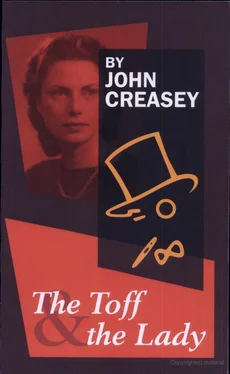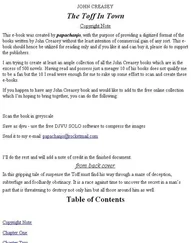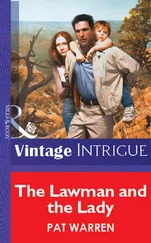John Creasey - The Toff and The Lady
Здесь есть возможность читать онлайн «John Creasey - The Toff and The Lady» весь текст электронной книги совершенно бесплатно (целиком полную версию без сокращений). В некоторых случаях можно слушать аудио, скачать через торрент в формате fb2 и присутствует краткое содержание. Жанр: Старинная литература, на русском языке. Описание произведения, (предисловие) а так же отзывы посетителей доступны на портале библиотеки ЛибКат.
- Название:The Toff and The Lady
- Автор:
- Жанр:
- Год:неизвестен
- ISBN:нет данных
- Рейтинг книги:5 / 5. Голосов: 1
-
Избранное:Добавить в избранное
- Отзывы:
-
Ваша оценка:
- 100
- 1
- 2
- 3
- 4
- 5
The Toff and The Lady: краткое содержание, описание и аннотация
Предлагаем к чтению аннотацию, описание, краткое содержание или предисловие (зависит от того, что написал сам автор книги «The Toff and The Lady»). Если вы не нашли необходимую информацию о книге — напишите в комментариях, мы постараемся отыскать её.
The Toff and The Lady — читать онлайн бесплатно полную книгу (весь текст) целиком
Ниже представлен текст книги, разбитый по страницам. Система сохранения места последней прочитанной страницы, позволяет с удобством читать онлайн бесплатно книгу «The Toff and The Lady», без необходимости каждый раз заново искать на чём Вы остановились. Поставьте закладку, и сможете в любой момент перейти на страницу, на которой закончили чтение.
Интервал:
Закладка:
“Are you serious?” he asked.
“The story isn’t liked in certain quarters,” said Rollison, anticipating the truth, “and there will be repercussions. Of course, if you can prove that he’s missing, that’s a different matter, although even then the comments about his companies are pretty broad.”
“Oh, they don’t matter,” said Keller, squeaking. “They’re facts—you can find them on the City page of any newspaper.
The other” he pursed his thin lips. “Are you from the family, by any chance?”
“They don’t know I’m here,” said Rollison.
“Hmm. Well, to tell you the truth,” said Keller, confidentially, “I got a little bit tiddly last night. Not a thing I do often,” he added, hastily. “I shot a line or two about the Barrington-Ley business, and a fat little chap who was in the “Chameleon” got my ear. Breathed deep, dark secrets. Barrington-Ley missing from home, family greatly worried, you know the kind of thing. I checked here and there—telephoned his country home and the London house, got evasive replies, and it all seemed to tie up. The truth is,” said Keller, a little sadly, “I ought to stick to the City. I always go outside when I’ve had one or two—subconscious longing, I suppose, I used to think I would make a good reporter. Er—seriously, will there
be trouble?”
“If I were you I would build a good defence,” said Rollison.
“Oh, I will. I will! It’s a good thing you warned me, or I would have forgotten it,” said Keller. “I wish I could think of the fat fellow’s name. He did give it to me. Smith, I think.”
“Or Brown,” said Rollison, sardonically, “or, by a great stretch of the imagination, Pomeroy.”
“It wasn’t Pomeroy,” said Keller, decidedly. “Nice little chap, very soft voice, looked like a butler.”
“Pointed chin with bags of flesh on either side?” asked Rollison.
“That’s the man! Now I come to think of it,” said Keller, “he was a bit anxious that I should know the whole truth. Usually they ask for a fiver for the story, and we don’t say no. He just wanted to dispense information. I say, is Barrington-Ley missing?”
“I shouldn’t rely on it,” said Rollison. “You can’t recall the fat man’s name, I suppose. Was it Shayle?”
“No,” said Keller, firmly. “No, it was something more common-or-garden that that. Smith has it. Or, as you say, Brown. I am a damned fool!” he added, shrilly. “Still. forewarned and all that. Very nice of you to come. I’ll have a de-fence like reinforced concrete if the Old Man asks me about it —and he will, he always does if there’s anything the slightest bit wrong. I say, old chap,” he added, with a sly look, “you couldn’t give me a pillar or two for the defence, could you? It’s your market, you know.”
Rollison said: “What time did you put the story in?”
“Oh, half-past one or thereabouts, it missed the country editions. That’s a help, the Old Man’s gone north, I think. Or was that yesterday? Why?”
“There was an attempt to murder Miss Barrington-Ley before midnight,” said Rollison. “You could have heard rumours of that, but because you wouldn’t put in anything you couldn’t vouch for, you didn’t use that story. That would show perspicacity wouldn’t it?”
“I say, that’s pretty good!” said Keller, beaming. “Miss B.-L. was hurt, was she?”
Yes. And if you have a word with Teddy and send him over to Barrington House to make inquiries, it would round off your defence,” said Rollison. “Of course, that’s only a suggestion.”
Rollison left the office, not dissatisfied. Before his righteous outburst at Barrington House, Pomeroy had made sure that the newspapers knew of Barrington-Ley’s disappearance, which was a curious fact, to say the least. Here was confirmation, if it were wanted, that there was much more behind the story than Grice suspected.
Rollison went to Aldgate by taxi, then took a bus along the Mile End Road. The people and the traffic streamed by him, and he felt stirred by this contact with the East End, which to so many looked drab and to him looked so colourful. People whom he knew or had met passed him, not knowing he was there, little crooks mixing with men and women who were as strictly law-abiding as any in the country, bookmakers perpetually warring with the police, professional pick-pockets and bag-snatchers who spent half their time in prison and the other half trying to keep out, but who did not seem able to give up the game. Here they thrived, amiable little people for the most part, with their own code of honour and a suspicion and dislike of the police which ran side-by-side. Nine out of ten he passed would no more steal or pick pockets than commit murder, but when the police wanted information about this man or that, they were sphinx-like. In many ways a strange motley, with a mixture of all races, Jews and Gentiles shoulder to shoulder in a curious fraternizing which so often led to many people, all self-righteous, drawing the wrong conclusions.
He almost forgot Lila, Countess Hollern, and over-shot his stop, so that he had to walk back along the crowded pavements, with trams clattering past him and shopkeepers’ touts watching him hopefully, for the rich sometimes came to the East End to pick up “bargains”, and complained when they were disappointed. There were two sides to every bargain in the East End.
One thing was noticeable; no one seemed to recognize him.
At one time he could not have walked along this thoroughfare without being noticed, spoken to, nodded at, pointed out and certainly scowled at ferociously. It was a reflection on the rarity of his visits of late.
At last he reached Eddie Day’s public house, behind which there was a gymnasium, for Eddie Day, a large man now running to fat, had been a boxer in his youth and still loved the sport. Chopping blocks and coming champions were nursed under his benevolent wing. Those who could afford to pay for training paid, those who could not were trained all the same, and few failed to recompense Eddie Day when they began to earn money.
There were only three people in the public bar, and no one was behind it. The occupants looked up at Rollison, and as quickly looked away. All were strangers to him, and all were suspicious of a well-dressed man of Rollison’s appearance in the bar.
Then Eddie Day waddled behind the bar. His face was pale, his eyelids drooped, he looked tired—as he always did—and his little ears, delicate almost as a child’s were prominent only because he was nearly bald.
“Hallo, Eddie,” said Rollison.
Eddie looked up—and his little mouth gaped. He raised both hands, kept staring, then broke into a smile which seemed to double the size of his mouth, and brought his hands crashing down on the bar.
“Bless my ‘eart an’ soul, if it ain’t Mr. Ar! Well corlummee, if it ain’t Mr. Ar! Well, I never did!” He took Rollison’s hand in his vast fingers and squeezed it. “I never did!” he said, wheezing. “I thought you’d deserted us, Mr. Ar, ever since the curate business you ‘aven’t put your nose inside the place. Good boy, that parson, though I say.it myself—do you know what?”
“What?” asked Rollison, greatly pleased.
“My ole woman’s deserted the Army, an’ now she goes to church, that’s a fack. Proper looks dahn on them brass-blowing buglers, she do, and her uniform—she just won’t put it on. I bought ‘er a n’Ancient an’ Modern fer ‘er birfday, you know, one wiv music, and she was as prahd as punch of it, proper prahd. Gets a bit monotonous singing ‘ymns every night.” added Eddie Day, “but still, anythink for a quite life, I says.” He paused, and then burst out: “Now what am I a-thinking of, Mr. Ar—what’ll you ‘ave? The same?”
Читать дальшеИнтервал:
Закладка:
Похожие книги на «The Toff and The Lady»
Представляем Вашему вниманию похожие книги на «The Toff and The Lady» списком для выбора. Мы отобрали схожую по названию и смыслу литературу в надежде предоставить читателям больше вариантов отыскать новые, интересные, ещё непрочитанные произведения.
Обсуждение, отзывы о книге «The Toff and The Lady» и просто собственные мнения читателей. Оставьте ваши комментарии, напишите, что Вы думаете о произведении, его смысле или главных героях. Укажите что конкретно понравилось, а что нет, и почему Вы так считаете.












